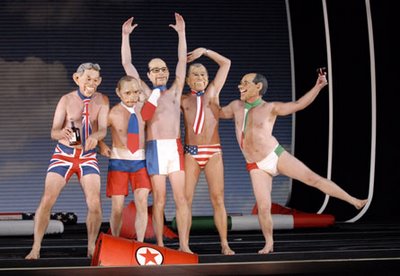Candide Goes to Paris
 Candide, directed by Robert Carsen, 2006, Théâtre du Châtelet, photo by Marie-Noëlle Robert |
This did not stop him from unlacing and relacing the work in his way, as if he had been thinking about the problem for 15 years. That is how Carsen confronted the rather troubled history, through numerous reworkings, of a score that remains problematic -- it has been revised, rerecorded, reorchestrated, etc. Intended for the Broadway stage without being a musical, Candide has often been heard in international opera houses without being an opera either. After having endured (unlike one part of the audience) the three hours and some of a sinister spectacle that was intended to be funny and interesting, one thinks that Carsen should have gone to see what others had done with Candide.Christian Merlin saw things quite differently in his review (Candide de Bernstein : Tourbillon festif, December 14) for Le Figaro (my translation):
This work, whose words were written by several people -- Richard Wilbur, Stephen Sondheim, John Latouche, Lillian Hellman, Dorothy Parker -- is part of the political context of its time, among other things, an acerbic criticism of McCarthyism. But was it necessary to use the food processor on a message that anyone could understand? The dialogue has been rewritten, Westphalia becomes "West Failure." The parade of anti-American clichés is a constant embarrassment visually and for the work's pacing. Believing the second act to be weak, as he put it, Carsen overburdens and stretches it out, removes all the tension and makes it flat. The scene that caricatures the five presidents of the entente cordiale, including Jacques Chirac with a bottle in his hand, has nothing funny or sarcastic about it; it is, as so often with Carsen, the stupidest way to read the passage.
Sacré Robert Carsen! This clever devil is just as capable of sounding the depths of the human soul by transposing Richard Strauss's Die Frau ohne Schatten to the time of Freud as transporting you in a festive whirlwind worthy of Broadway. As soundly as the Châtelet, in its new popular political stance, had failed to give life to Le Chanteur de Mexico, it has succeeded brilliantly with Candide. It must be said that the vehicles could not be more different: Francis Lopez and Leonard Bernstein are like a Citroën 2 CV and a Rolls Royce. Premiered in 1956, Bernstein's operetta has waited 50 years to get its Parisian debut. We knew the music was ingenious, and now we know that the piece works on the stage. At least if you have the proper means: with his set designer Michael Levine and the tireless machinistes of the Châtelet, Carsen takes us into Hollywood cinema. The stage becomes a 1950s television screen where we find ourselves in the time of McCarthyism and the Kennedys, with each scene being a pretext for a backdrop change. It's bright, funny, breath-taking, without forgetting that the satire of the American Dream also applies to today's world. Only the second half drags a little, in spite of skillful updating.
Bertrand Dermoncourt, Candide (Théâtre du Chatelet) (L'Express, December 15) Caroline Alexander, La joyeuse férocité de Voltaire et Bernstein (Webthea, December 19) |
It is, more precisely, associated with one area: Broadway. It is viscerally American, even if it is rooted partially in Europe and if, over time, other countries have started to produce them. [...] Often musicals are a series of diverting scenes with a rather thin plot that serves only to make the songs and dances stand out. [...] The musical owes a large part of its qualities to its economic situation: musicals are always created in private theaters by independent producers. They finance the performances only by tickets sold. To have a chance at lasting (and being remembered by history), a musical thus has to meet with public success and has an obligation to please. Faced with that demand, composers and librettists are rewarded for their aptitude in making an individual work while keeping in mind the commercial imperative.I love France. Of course, because in France they spend money on good cultural programming on both television and radio, Candide will be played twice on the public airwaves: on Arte TV (January 20, 10:30 pm) and on France Musique radio (February 7, 8 pm).





















































3 comments:
Nicely balanced and informative--my first visit to this blog. I happened to read on another blog, La république des livres, that the artistic director of La Scala saw Candide at the Châtelet and immediately took it off his production schedule for what sounded like political reasons--it had been planned for June 2007 in Milan.
Richard, thanks for that. I mentioned the La Scala news in a later post. The latest is that Carsen has agreed to alter the production for Milan, so Lissner reinstated it.
Yes, Iojima, I have lived in France. Perhaps you have not lived in Washington, to know just how bad cultural television and radio can be. Whatever the quality of their recording library, France Musique excels at live broadcasts or rebroadcasts of performances.
Post a Comment